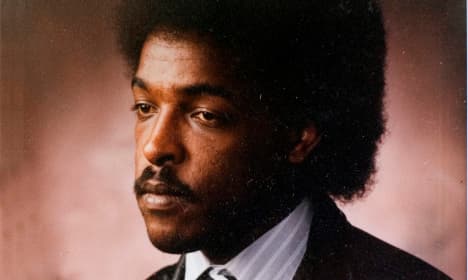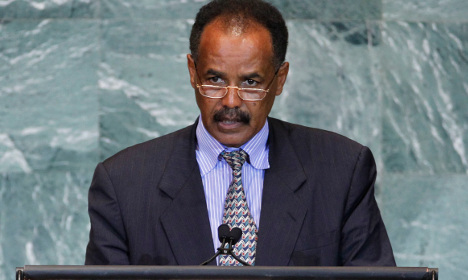'Time to free Swedish journalist Dawit Isaak'

Swedish-Eritrean journalist Dawit Isaak has spent the past 13 years imprisoned in Eritrea, which has been criticized by several human rights organizations. In this week's exclusive debate article for The Local, US campaigner Kerry Kennedy writes that it is time for the Swedish government to step up the fight to secure his release.
This past January, some good news finally emerged from the Horn of Africa: the Eritrean government released six journalists it had imprisoned since 2009. It was a rare victory for free expression in Eritrea, which has ranked last in Reporters Without Borders' Press Freedom Index for seven years in a row.
Unfortunately, Dawit Isaak was not among the freed journalists. Mr Isaak, a dual Swedish and Eritrean national who co-owned Setit, Eritrea's first independent newspaper, has been a prisoner of President Isaias Afwerki's regime for 13 years. In all that time, Mr Isaak – the only EU citizen currently held as a prisoner of conscience – has never received a formal hearing of the charges against him, nor has he been granted a trial. He has had no contact with relatives, no access to Swedish consular officials, and no recourse to a lawyer – all flagrant violations of his human rights.
Mr Isaak's case is particularly urgent because of concerns about his health. Mr Isaak, who suffers from diabetes, is believed to have been held since 2008 at the maximum-security Eiraeiro prison, located a short distance outside the capital, Asmara. Prison conditions in Eritrea are grim, with poor sanitation and no adequate medical care. Summer temperatures regularly reach 45C (113F). Seven of Mr Isaak's colleagues have died in captivity. The Eritrean regime has so far stymied all attempts to free Mr Isaak. In 2011, his European lawyers filed a habeas corpus petition with Eritrea's High Court – it was ignored. Appeals from the Swedish government, the European Union, the United Nations and the International Red Cross have proven equally fruitless.
Unfortunately, this stonewalling is typical of Eritrea, a country of about six million people nestled against Sudan. Though Eritrea attracts little notice in the West, it is one of the world's most despotic nations. It has no functioning legislature or independent judiciary, and the freedoms of expression and association – cornerstones of an open society – are routinely trampled. The Afwerki regime is severely isolationist, and strict sanctions have done little to curb its support for terrorist groups abroad and its cruelties at home. So severe is Eritrea's alienation from the international community that its leadership was not invited to the US-Africa Leaders' Summit in Washington last summer where even despots like Swaziland's King Mswati III and The Gambia's Yahya Jammeh were able to meet with President Obama.

President Isaias Afwerki of Eritrea. Photo: AP Photo/Jason DeCrow
Mr Isaak's case offers an opportunity to galvanize support for the cause of a more just and stable Eritrea. And yet the international community and the Swedish government have so far declined to use the most promising tool at their disposal to pressure the Eritrean government. Sweden recently passed a law that significantly underlines its commitment to the principle of “universal jurisdiction” – the idea that every state has an interest in prosecuting crimes against humanity.
Universal jurisdiction is not merely symbolic. Among other things, it severely limits the Eritrean leadership's ability to travel or access financial assets held abroad, sanctions that would have a direct effect on President Afwerki and his cabinet. President Afwerki's decision to release the six journalists is a sign that he may at last be yielding to international pressure. Now is not the time to let up. But despite the new law backing its power to bring a case against Eritrea, the Swedish Prosecutor's Office decided last July against opening an investigation into Mr Isaak's case, arguing that it would require the cooperation of the Eritrean authorities, a highly unlikely scenario.
In response to an appeal filed by Mr Isaak's lawyers, Sweden's Prosecutor General last month took a somewhat different view but ultimately chose no to overturn the original ruling. Most significantly, he agreed that the enforced disappearance of Dawit Isaak and his colleagues meets the standard of “crimes against humanity” and that a formal investigation of the charges against Eritrea's leadership could and should proceed.
Swedish officials should make full use of their nation's robust new universal jurisdiction law. The statute not only provides an important opportunity to look after its own citizens, but it also strikes a blow for the legitimacy of international human rights law. Eritrea may still decide to ignore a Swedish investigation, but without any attempt to open one, we cannot be certain. What we do know for certain is how Eritrea will behave without any international attempts to secure Mr Isaak's freedom. It will act as it has since it won its independence more than 20 years ago: with impunity.
Kerry Kennedy is the President of the Robert F Kennedy Center for Justice and Human Rights based in Washington DC.
Comments
See Also
This past January, some good news finally emerged from the Horn of Africa: the Eritrean government released six journalists it had imprisoned since 2009. It was a rare victory for free expression in Eritrea, which has ranked last in Reporters Without Borders' Press Freedom Index for seven years in a row.
Unfortunately, Dawit Isaak was not among the freed journalists. Mr Isaak, a dual Swedish and Eritrean national who co-owned Setit, Eritrea's first independent newspaper, has been a prisoner of President Isaias Afwerki's regime for 13 years. In all that time, Mr Isaak – the only EU citizen currently held as a prisoner of conscience – has never received a formal hearing of the charges against him, nor has he been granted a trial. He has had no contact with relatives, no access to Swedish consular officials, and no recourse to a lawyer – all flagrant violations of his human rights.
Mr Isaak's case is particularly urgent because of concerns about his health. Mr Isaak, who suffers from diabetes, is believed to have been held since 2008 at the maximum-security Eiraeiro prison, located a short distance outside the capital, Asmara. Prison conditions in Eritrea are grim, with poor sanitation and no adequate medical care. Summer temperatures regularly reach 45C (113F). Seven of Mr Isaak's colleagues have died in captivity. The Eritrean regime has so far stymied all attempts to free Mr Isaak. In 2011, his European lawyers filed a habeas corpus petition with Eritrea's High Court – it was ignored. Appeals from the Swedish government, the European Union, the United Nations and the International Red Cross have proven equally fruitless.
Unfortunately, this stonewalling is typical of Eritrea, a country of about six million people nestled against Sudan. Though Eritrea attracts little notice in the West, it is one of the world's most despotic nations. It has no functioning legislature or independent judiciary, and the freedoms of expression and association – cornerstones of an open society – are routinely trampled. The Afwerki regime is severely isolationist, and strict sanctions have done little to curb its support for terrorist groups abroad and its cruelties at home. So severe is Eritrea's alienation from the international community that its leadership was not invited to the US-Africa Leaders' Summit in Washington last summer where even despots like Swaziland's King Mswati III and The Gambia's Yahya Jammeh were able to meet with President Obama.

President Isaias Afwerki of Eritrea. Photo: AP Photo/Jason DeCrow
Mr Isaak's case offers an opportunity to galvanize support for the cause of a more just and stable Eritrea. And yet the international community and the Swedish government have so far declined to use the most promising tool at their disposal to pressure the Eritrean government. Sweden recently passed a law that significantly underlines its commitment to the principle of “universal jurisdiction” – the idea that every state has an interest in prosecuting crimes against humanity.
Universal jurisdiction is not merely symbolic. Among other things, it severely limits the Eritrean leadership's ability to travel or access financial assets held abroad, sanctions that would have a direct effect on President Afwerki and his cabinet. President Afwerki's decision to release the six journalists is a sign that he may at last be yielding to international pressure. Now is not the time to let up. But despite the new law backing its power to bring a case against Eritrea, the Swedish Prosecutor's Office decided last July against opening an investigation into Mr Isaak's case, arguing that it would require the cooperation of the Eritrean authorities, a highly unlikely scenario.
In response to an appeal filed by Mr Isaak's lawyers, Sweden's Prosecutor General last month took a somewhat different view but ultimately chose no to overturn the original ruling. Most significantly, he agreed that the enforced disappearance of Dawit Isaak and his colleagues meets the standard of “crimes against humanity” and that a formal investigation of the charges against Eritrea's leadership could and should proceed.
Swedish officials should make full use of their nation's robust new universal jurisdiction law. The statute not only provides an important opportunity to look after its own citizens, but it also strikes a blow for the legitimacy of international human rights law. Eritrea may still decide to ignore a Swedish investigation, but without any attempt to open one, we cannot be certain. What we do know for certain is how Eritrea will behave without any international attempts to secure Mr Isaak's freedom. It will act as it has since it won its independence more than 20 years ago: with impunity.
Kerry Kennedy is the President of the Robert F Kennedy Center for Justice and Human Rights based in Washington DC.
Join the conversation in our comments section below. Share your own views and experience and if you have a question or suggestion for our journalists then email us at [email protected].
Please keep comments civil, constructive and on topic – and make sure to read our terms of use before getting involved.
Please log in here to leave a comment.